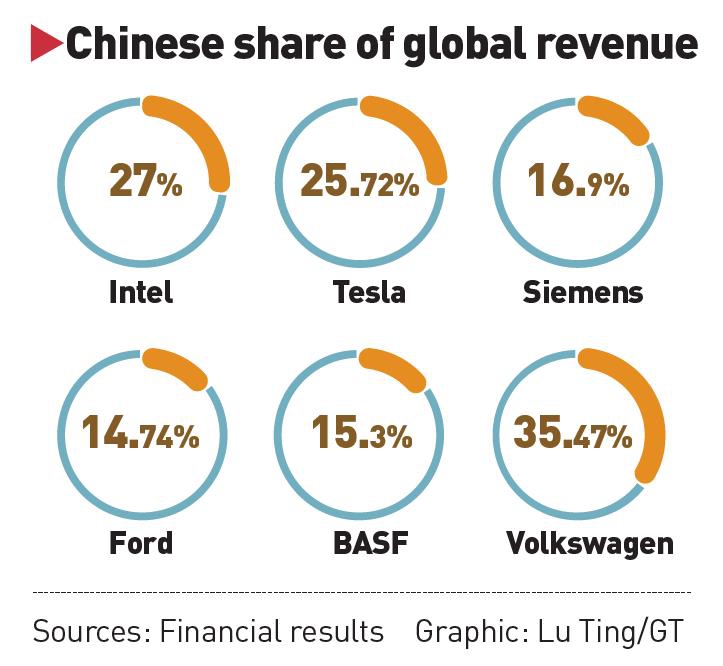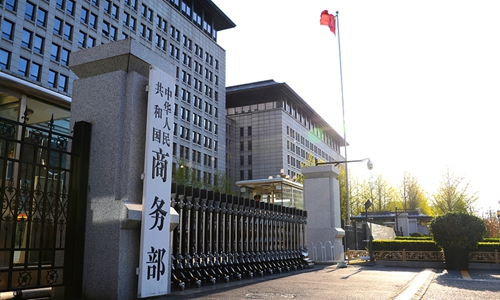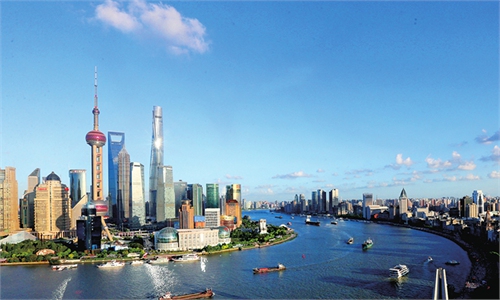At major summit in Qingdao, global multinationals express confidence in Chinese market
Expansion plans refute 'mass withdrawal' claims

Night view of Qingdao, East China's Shandong Province Photo: VCG
As thousands of representatives from over 300 global businesses gathered in Qingdao, East China's Shandong Province for a major multinational summit on Sunday, many expressed unwavering commitment to the Chinese market and talked about expansion plans instead of withdrawals, highlighting solid confidence among foreign companies in the Chinese economy.
A sustained focus on investing in China speaks volumes against fear-mongering claims about so-called mass withdrawal of foreign investment, experts said, reckoning the Chinese market is a silver lining for overall global sluggishness.
Speaking at the opening ceremony of the third Qingdao Multinationals Summit on Sunday, Chinese State Councilor Wang Yong said that China would effectively coordinate epidemic containment efforts with economic and social development.
In addition, the country would allow for easier market access, foster fair competition, enhance trade and investment liberalization and facilitation, for there to be a market-based, law-abiding and internationalized business environment.
The fundamentals of the Chinese economy that retain good momentum over the long term stay unchanged despite the current domestic and global complexities, Wang said.
The opening ceremony of the third Qingdao Multinationals Summit was held on Sunday, both in-person and online, with attendees from 186 Fortune 500 firms from across the globe, 290 industry heavyweights, international organizations, experts and scholars, the state broadcaster reported.
The event runs until Tuesday, focusing on topics ranging from global industry and supply chains to the implementation of the Regional Comprehensive Economic Partnership pact to green and low-carbon transformation.
A total of 313 overseas multinational firms from 31 countries and regions have signed up for on-site participation in the summit, with the number of participants up 46 from the previous summit, according to Shandong-based news portal dzwww.com. More than 3,000 guests from multinationals registered for online activities.

Chinese share of global revenue of multinationals Graphic: GT
The Qingdao Multinationals Summit is the first major event this year that has gathered foreign businesses due to the coronavirus, Toshihiro Ueda, chief representative in China for Japanese glass manufacturing giant AGC Group, told the Global Times.
As a foreign firm that's deeply committed to the Chinese market, AGC would remain focused on its commitment and has plans to expand its footprint in the market, according to Ueda, a third-time participant in the summit.
The Japanese firm is particularly keen on the Chinese economy and market, and it envisions a closer tie-up with China, Ueda said, expecting the Qingdao event to inject optimism into foreign firms with operations in China about the country's growth prospects and business environment.
The global economy is mired in a COVID-19-inflicted stalemate and foreign businesses operating in the Chinese market are acutely keen on the Chinese economy's future development trends, the Japanese business executive commented.
Ueda voiced his optimism on the attractiveness of the Chinese market over the long term despite the virus fallout on the economy in the short run, citing the sheer size of the market and a strong business environment.
AGC would ramp up its China investment in areas such as energy efficiency and emissions reduction, he noted.
"The third Qingdao Multinationals Summit once again demonstrates China's ever-opening market, which consolidates our determination to expand our investment in China," Leon Wang, Executive Vice President of AstraZeneca, told the Global Times, praising the Chinese government for creating a great investment and business environment for multinationals.
The British-Swedish pharmaceutical company, through its regional headquarters strategy in China, "will continue to deepen local investment, increase diversified cooperation, and upgrade the medical and healthcare innovation ecosystem constantly," said Wang.
"By building a multi-tiered healthcare innovation ecosystem, we will work with the government of Qingdao and Shandong to create a biomedical innovation powerhouse with extensive influence, contributing to the high-quality development of the local economy," he remarked.
The avowal of continued investment in the country indicates that the foreign business community at large remains ready to raise its stakes in the Chinese market, rather than the other way around as hyped by some people, Tian Yun, a Beijing-based economist, told the Global Times.
Official figures also pointed to the same trend. In the first five months of the year, the country's actual use of foreign investment rose by 17.3 percent year-on-year to 564.2 billion yuan, or rather, it gained 22.6 percent in US dollar terms year-on-year to $87.77 billion, per data from the Ministry of Commerce.
A breakdown of the numbers showed that South Korea's actual investment in China soared 52.8 percent, while that from the US jumped 27.1 percent and German investment in China grew by 21.4 percent.
The stellar growth figures point to a conspicuous uptrend in foreign commitments to China, especially for foreign businesses that have competitive edges, Tian said.
As for a relocation of some foreign firms into Southeast Asia, that's mostly about such businesses losing steam in competitiveness in the Chinese market, which prompts them to shift to other markets seeking lower costs, the economist noted.



